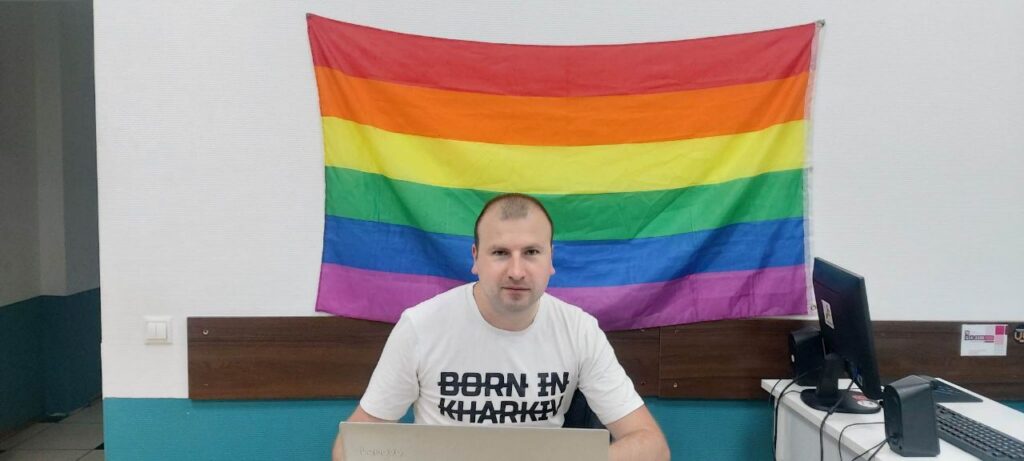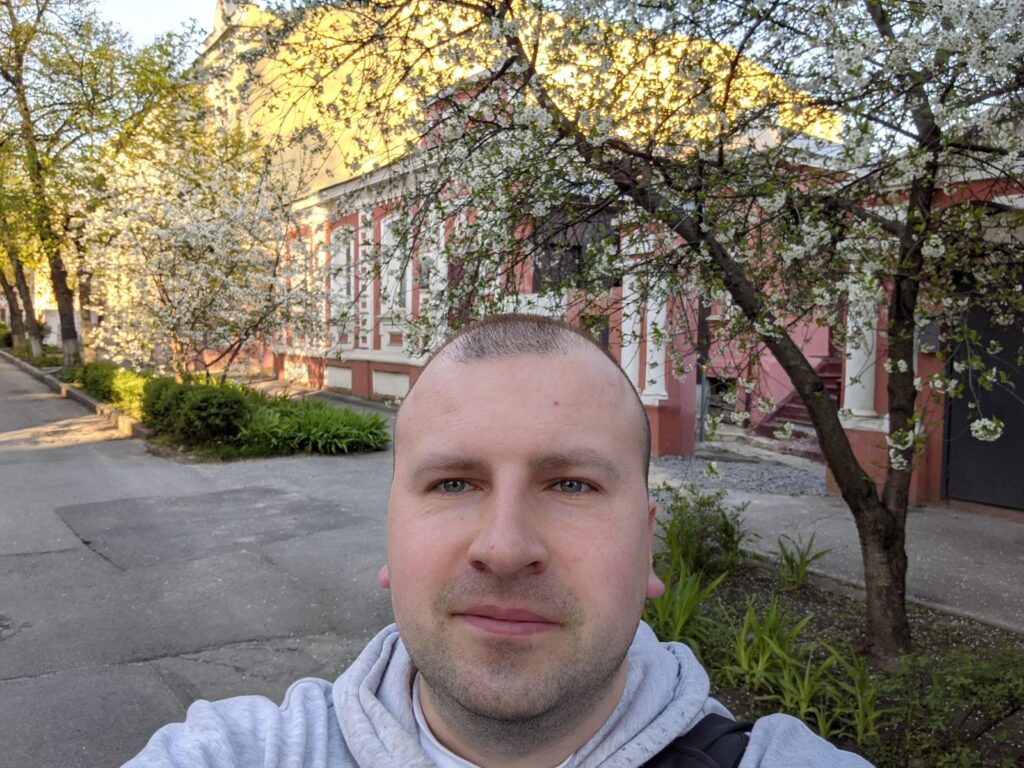The head of the board of the public organization, “SPECTRUM KHARKIV” Vasyl Malikov, was caught in the war in his native Kharkiv. Since then, the human rights activist has not left the country but continues to help representatives of the LGBT community. And if before the war, the list of services of the organization mainly included consultations with a psychologist, lawyer, social worker, referral to doctors, and HIV prevention; with the onset of the war, this list stretched to infinity. Donors who have also helped the organization’s beneficiaries include virusoff.info and ViiV Healthcare. Vasyl Malikov talked about why any assistance is important when the country is under martial law and what will happen after the end of the war in an interview for www.virusoff.info.
I understand you are now in Ukraine; why haven’t you left yet?
This is an unexpected question. I’ll try to explain. It seems to me that some decisions are quite natural for me. For example, since the beginning of the full-scale russian invasion of Ukraine, I was still in Kharkiv for several days – 40-50 km to the border with russia. And when the rockets began to explode near my house, and he walked all the way, I managed to evacuate to the Dnipro thanks to my friend and companion in LGBT activism and his colleagues. In the car on the way to the Dnieper, I continued to advise people by phone and online, and the most frequent question at that time for HIV-positive people was: “Where to get ARV therapy?”. It so happened that these first days I was in touch online 24/24 and was a link between the medical staff of the AIDS Centers, who continued to work, and people who did not know who to contact, where to go, and what to do. After all, the registry phone did not work, and it was impossible to get any information. It was unexpected and unplanned, and everything happened by itself. And perhaps, this is an example that some decisions are made spontaneously. It’s just that you face a task, and you solve it.
I never had a question about staying in Ukraine or go because I was already in Ukraine. This is my country; I was born here, I work here, and I help people.

After my move to Dnipro, where I lived in a shelter for several months, I was simultaneously engaged in its administration. This is a shelter created with the support of Alliance.Global after the outbreak of a full-scale war. Similar shelters were also opened in Chernivtsi and Kyiv. I spent a few months here. During this time, I continued to travel to Kharkiv because I received pre-exposure prophylaxis for shelter guests and those who came there for help. In mid-May, I finally returned home to Kharkiv.
How did virusoff.info and ViiV Healthcare help you, and how important was it to you?
You know, any help is important, that’s for sure. In my understanding, there is no significant or insignificant help. Each aid finds its recipient. We started by forming food kits for LGBT people in Kharkiv. It was extremely important for them at that moment. I want to note that such assistance does not only provide people with food. After all, we covered this need only partially. This is also about the fact that LGBT people thus feel support in times of crisis. In general, it is imperative that this community feels that there is support from outside. It seems to be happening here on the spot, but it connects LGBT people in Kharkiv and the rest of the world, allowing you to feel that you are not alone and in solidarity.
In addition to food kits, thanks to the support of virusoff.info and ViiV Healthcare, we provided material assistance. For example, guys with jobs do not always have enough money for the next salary. And there are expenses you can not postpone: mobile communication, for example. There were also situations when people who were forcibly displaced got a job but did not have enough money for the first salary, and they had to pay utility bills. Or they got a job, but they needed basic clothing. For example, we had a guy who got a job as a cook and needed to buy several sets of uniforms. Each of our beneficiaries has different needs, and the fact that we have different tools to meet them is essential.

I understand that the question is strange, but how did the war change you? How did it affect your work? It feels like everyone is used to it.
I don’t want to think about getting used to war; it’s not a thing you can get used to. It seems to me that war is not something that changes people. Like any crisis, it reveals people and, in a sense, allows them to act in accordance with their values. Therefore, in my understanding, war can hardly contribute to any changes. On the other hand, humanitarian support has appeared in our work and everyday life. We did not do this before the war in such a form and to such an extent. Now we have begun to work very hard within the community to strengthen ties between people. The war, unfortunately, destroyed them, and many were forced to leave their usual environment. So today, one of the goals of our work is to restore them.
Previously, our work mainly focused on conducting educational or leisure activities. This priority has not gone away. We just started doing something else. Also, I can’t help but note the incredible cohesion and activity among the volunteers. Since the beginning of the war, a huge number of people have helped us on a voluntary basis, and this is very valuable when people contribute to helping themselves and others. That’s just great! Significant community changes are impossible without the people in the community themselves. The war made us realize this.
Don’t you think that all this unprecedented support will evaporate after the war?
Here we are faced with another illusion that as soon as the war is over, everything will immediately be fine. It is the end of the war itself, when people cease to die, when there is no more destruction – this is a significant and positive result. But this does not mean that the crisis caused by the war will stop at the end of hostilities. Unfortunately, no, it doesn’t work that way. We understand that now. For example, some people from the community, our colleagues, and volunteers had a margin of safety, but now we see how it is slowly running out. Even I can see that I’m getting more and more tired. We have never had such a volume of work that has occurred in our country since the beginning of the war. This is difficult, and fortunately, thanks in part to volunteer support, the burden is lifted. But it’s still pretty big. And this burden will not decrease at the end of the war, unfortunately. A lot of people have suffered the usual circle of communication, they have moved many times, and it is very difficult to restore all this. Therefore, the work will continue after the end of the war. And I very much hope that external support will continue. It will take many years to restore everything that has been acquired and developed over the years. But we do not lose faith that this will happen.
Olena Derzhanska



